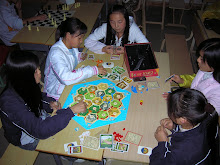We were just outside a small dumpling restaurant in Chongqing, a city of about 4 million people, when it happened. I was talking about international chess (the term used for non-Chinese chess in China) with another volunteer. That’s when I heard the yelling and the crying.
I was still in awe of the difference between my experiences in Anshun and that of the volunteers who lived in this enormous city. The local volunteers had casually talked through dinner about their students, whose English levels seemed to be very high. Earlier that day we had eaten in a Pizza Hut, which was just down the street from a McDonald’s and a Starbucks. The buildings commonly stretched past 40 stories and people didn’t whisper “foreigner” as we passed: we were old news in this city. When we asked directions the people spoke Mandarin (rather than a thick dialect) and we could understand clearly.
Honestly we felt like country bumpkins. We were 5 volunteers from Guizhou Province (the lowest per capita GDP of any Chinese Province). We had come to Chongqing to visit some of our friends during the National Holiday known as Tomb Sweeping Festival (similar to Memorial Day). Later we might complete this City Mouse, Country Mouse story by hosting our big city friends.
When we arrive we feel out of place. The city’s huge bridges span the Yangtze River and we peer out of taxicabs in awe of the area's sheer size. It was difficult to explain the differences to the local volunteers because there wasn’t much to say: you live in a big place, we live in small places. The river that runs through their city seems to be the difference between economic prosperity and geographic isolation. The opportunities for education and success are abounding, as Chinese friends of volunteers could demonstrate (they spoke English despite having a different major).
After eating dinner we were going to go take the monorail to the city center. I hadn’t yet seen a monorail in China, and I was looking forward to this novelty. As we were leaving I spoke with another volunteer about chess.
I think there were nine of us on the street, but I can’t remember exactly. Something was very clear about the moment: I felt helpless and angry. Afterwards I felt confused and a continued feeling of helplessness haunted me.
At the edge of the sidewalk there was a problem. A young girl (perhaps 12 years old) was crying, and her mother was standing in front of her, yelling. We quickly realized that the girl was kneeling on the sidewalk curb, alongside the road. The woman was yelling something that we couldn’t understand and slapping the girl over and over again. We all stopped. The girl would cry out, the woman would slap her and yell at her, and then it would repeat again. We looked at one another, almost desperate for an easy answer to this predicament. It seemed so clear at the time: the right thing to do was to intervene, but we were too afraid to do so. Right?
I think everyone in our group wanted to intervene. From the look of other Chinese people, they seemed to be thinking the same thing. And yet we all were frozen. It’s likely that we were all thinking about what to do. What could we do? Step in, tell her to stop? Call the police? Perhaps we waited because we were ready to help if the girl fell into the street. But what should we have done? Eventually we wandered down the street, away from the confrontation. We watched from a distance and waited to see if the situation would become more violent. We were all concerned and we felt trapped, but we would certainly intercede if the situation escalated.
Later we talked about it. We needed to say something, we needed to understand and somewhere deep inside I think we sought to justify our inaction. I explained that I was confused and surprised, but if I ever saw something like this again I would certainly intervene. I thought that I had made a mistake this time, but next time I would be ready. Perhaps I would run up to the mother and ask if she had the time, try to distract her or make her realize what she was doing. But then, perhaps she already knew there were others around. Maybe that was part of the punishment for this child. It took the thinking of another volunteer for me to realize that it probably wasn’t our place to intervene.
A friend of mine is another American volunteer whose parents were born in Korea. He challenged my proposition to intervene by saying that I would be trying to contradict 5,000 years of history by doing so. My thoughts were that there ought to be universal human rights, and they ought not include getting slapped while you kneel on the side of the street, but my friend continued and explained that kneeling was a cultural aspect of punishment. Depending on how one looks at the situation, kneeling can be demeaning or show respect for the person in front of you.
During our conversation I never decided that what happened was OK. I find what happened deplorable and I think that Chinese culture does not universally condone such behavior. But I did change my mind about getting involved in a situation I didn’t understand, within a culture that is filled with ambiguity. It also made me think about how I would react to a similar situation in the United States. At what point would I interfere? Would I simply call the police?
There is a common story about a man who is hitting his wife. A passerby decides to intervene and suddenly finds that the wife is helping to defend the husband. In an effort to stop the violence, the passerby becomes the victim of a situation. Again, I don’t want to try and justify what my decision or my thinking, but I want to clarify our thinking and our discussion about the unfortunate event.
There are two things I have been afraid of as I continue to think about this incident. The first worry is that I will give an incorrect impression of Chinese culture. The incident was the first of its kind since I’ve been in China, and it was probably very strange by Chinese standards. If there is one cultural truth to be gleaned from this, it is that Chinese people commonly avoid conflicts. This is related to the desire to maintain harmony. Publicly hitting children is rare (as I’ve said, this was the first time I’ve seen it).
The second worry I have is that my own morality has lost some clarity. I cannot play by the same rules in China; I must adapt to cultural norms and be prepared to be confused. Sometimes there is no right answer, but only shades of consequence. Perhaps it is easy for you to say that you would have gotten involved or not. I know that I was so surprised and shaken by this incident that I can’t stop thinking about it.
4.06.2008
Subscribe to:
Post Comments (Atom)








No comments:
Post a Comment